
A toast (Malja) was raised to the center of Kuopio 28.4.2006 Kauppakatu 29's. The beer restaurant, wine bar and terrace serving a fully-licensed in a warm environment every day. The terrace is covered, equipped with a heat lamp and open all year round!
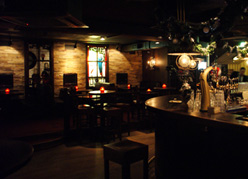
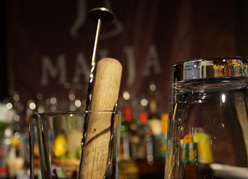
In winter season you can raise a Malja everyday from 4 pm - 02(03) am. During summer season we open the door 2 pm and Saturdays and Sunday at 12 pm. Winebar is at your service every Friday and Saturday night from 9 pm.
The interior of your bar is decorated with real materials and real ideas, nothing is fake in Malja. Also in mind was to arrange as many seats as possible to location and we are very happy with the results. Malja can seat up to 220 customers and our terrace can be filled with up 60 happy campers. You will find up to 100 different beers, ciders selected, parlor games, WiFi, library, as well as the best treatment. The terrace is covered, equipped with a heat lamps and open all year round!
The booths and corners offer you even a more private environment even if the bar is packed with customers. Major sporting events can also be watched for the main 40 inch screen in the beerhouse or the big screen in the winebar.
We offer treatment: Mon-Thu: 16-02, Fri: 14-04, Sat: 16-04 | Sunday 18-02
The beer and wine restaurant Malja - Kauppakatu 29, 70100 Kuopio - Finland
 Beer restaurant downstairs you will find up to 100 different beers, ciders selected, parlor games, WiFi, library, as well as the best treatment. Comfortable cushions and "own corners" enable a Private conversation. Unfortunately, due to the type of alcohol we are not able to put this comprehensive beer, cider or wine list is displayed. Sporting events are a World Cup viewing the TV from or big screen and beer restaurant in the wine bar side.
Beer restaurant downstairs you will find up to 100 different beers, ciders selected, parlor games, WiFi, library, as well as the best treatment. Comfortable cushions and "own corners" enable a Private conversation. Unfortunately, due to the type of alcohol we are not able to put this comprehensive beer, cider or wine list is displayed. Sporting events are a World Cup viewing the TV from or big screen and beer restaurant in the wine bar side.
Malja is Pilsner Urquell European Outlet of the Year 2006 & 2007!
Want to spend the evening playing board games? Trivial, Alias, chess, playing cards, the legendary Star of Africa, Kimble, and much more.
From downstairs you can find the Toast-bell. Ring the bell and staff provides you with a microfone. Now it your time in the spotlight. Make a speech to salute your friend, to celebrate your team’s success, to salute your hometown or whatever comes in mind. After your speech everyones raises a Malja!
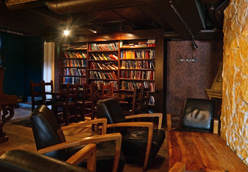 Our library works, of course in a specific way. You can enjoy the books while visiting Malja normaly, but if you desire to take a book home with you – it is not possible.
Our library works, of course in a specific way. You can enjoy the books while visiting Malja normaly, but if you desire to take a book home with you – it is not possible.
What you have to do, is to bring a other book with you (same quality, both in fysical condition of the book, as in contents of the book) and you can exchange it with the book you want! Make shure you consult with our staff before exchanging…
Lager is a type of beer that is fermented and conditioned at low temperatures. Pale lager is the most widely consumed and commercially available style of beer in the world. Bock, Pilsner and Märzen are all styles of lager. There are also dark lagers, such as Dunkel and Schwarzbier. While cold storage of beer, "lagering", in caves for example, was a common practice throughout the medieval period, bottom-fermenting yeast seems to have emerged as a hybridization in the early fifteenth century.
Pilsner (also pilsener, pilsen or simply pils) is a type of pale lager. It takes its name from the city of Plzeň, Bohemia, Czech Republic, where it was first produced in 1842. The original Pilsner Urquell beer is still produced there today Malja is Pilsner Urquell European Outlet of the Year 2006 & 2007!.
Ale Ale is a type of beer brewed from malted barley using a warm fermentation with a strain of brewers' yeast. Compared to lager yeasts, ale yeast ferments more quickly, and often produces a sweeter, fuller–bodied and fruitier taste. Most ales contain hops, which help preserve the beer and impart a bitter herbal flavour that balances the sweetness of the malt
Porter is a dark style of beer originating in London in the 18th century, descended from brown beer, a well-hopped beer made from brown malt. The name is thought to come from its popularity with street and river porters. The history and development of stout and porter are intertwined. The name "stout" for a dark beer is believed to have come about because a strong porter may be called "Extra Porter" or "Double Porter" or "Stout Porter".
Stout Stout is a dark beer made using roasted malt or roasted barley, hops, water and yeast. Stouts were traditionally the generic term for the strongest or stoutest porters, typically 7% or 8%, produced by a brewery. There are a number of variations including Baltic porter, dry stout and imperial stout. The term "Stout Porter" would later be shortened to just "Stout". For example, Guinness Extra Stout was originally called "Extra Superior Porter" and was only given the name Extra Stout in 1840.
Imperial stout, also known as Russian imperial stout or imperial Russian stout, is a strong dark beer or stout in the style that was brewed in the 18th century by Thrale's brewery in London, England for export to the court of Catherine II of Russia. Worth a try? USA? Try really dark Founders Imperial Stoutia!
Sweet stout or Milk stout Milk stout is a stout containing lactose, a sugar derived from milk. Because lactose is unfermentable by beer yeast, it adds sweetness, body, and calories to the finished beer. Milk stout was claimed to be nutritious, and was given to nursing mothers, along with other stouts, such as Guinness.
Wheat beer Wheat beer is a style of beer brewed with a large proportion of wheat malt; it includes Weissbier, Witbier and sour varieties such as lambic, Berliner Weisse and gose. Wheat beers are commonly marketed as spring or summer seasonal products. Bavarian-style wheat beer is usually served in 500 ml, vase-shaped glasses. In Belgium, witbier is usually served in a 25cl glass; each brewery (Hoegaarden, Dentergems, etc.) has its own shape of glass. Berliner Weisse is often served in a schooner.
IPA (Indian Pale Ale)is a hoppy beer style within the broader category of pale ale. It was first brewed in England in the 19th century. The first known use of the term "India pale ale" is an advertisement in the Sydney Gazette and New South Wales Advertiser in 1829. It was also referred to as pale ale as prepared for India, India Ale, pale India ale, or pale export India ale. The term pale ale originally denoted an ale that had been brewed from pale malt.
Lambic Lambic is a type of beer traditionally in the Pajottenland region of Belgium (southwest of Brussels) and in Brussels itself at the Cantillon Brewery and museum. Lambic is now mainly consumed after refermentation, resulting in derived beers such as Gueuze or Kriek lambic. Unlike conventional beers, which are fermented by carefully cultivated strains of brewer's yeasts, lambic is produced by spontaneous fermentation: it is exposed to the wild yeasts and bacteria that are said to be native to the Zenne valley, in which Brussels lies. It is this unusual process which gives the beer its distinctive flavour: dry, vinous, and cidery, usually with a sour aftertaste.
ESB eli Extra Special Bitter (English Pale Ale) ) is a famous style from Burton-on-Trent. Stronger body than ordinary bitter, but slightly less bitter. A balanced, easy drinking beer that is malty and strong but not overbearing.
Trappist Trappist beer is brewed by Trappist breweries. Ten monasteries — six in Belgium, two in the Netherlands, one in Austria and one in the United States — currently brew beer and sell it as Authentic Trappist Product. The Trappist order originated in the Cistercian monastery of La Trappe, France. Various Cistercian congregations existed for many years, and by 1664 the Abbot of La Trappe felt that the Cistercians were becoming too liberal. He introduced strict new rules in the abbey and the Strict Observance was born. Since this time, many of the rules have been relaxed. List of Trappist breweries:
St Benedictus Abadij – Achel: Panimo perustettu 1998, vuosituotanto 4500hl, Abbaye Notre Dame de Scourmont – Chimay: 1863, 123000hl, Abbaye Notre Dame de Orval – Orval: 1931, 45000hl, Abbaye de Notre Dame de Saint Rèmy – Rochefort: 1595, 18000hl, Abbaye N.Dame de la Trappe du S.Coeur – Westmalle: 1836, 120000hl, Abbaye Notre Dame de St Sixte – Westvleteren: 1838, 4750hl, Abbaye N.Dame de Koningshoeven – La Trappe: 1884, 145000hl.
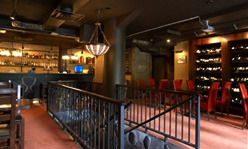 Our wine bar offers perhaps the most charming meeting space in town for you and your guests! The upstairs wine bar you can enjoy a rich selection of wines wines. Wine bar, sensible pricing also allows the "finer" wines tasted in a restaurant environment. Dish, professional staff are here to take the beer and wine-tasting.
Our wine bar offers perhaps the most charming meeting space in town for you and your guests! The upstairs wine bar you can enjoy a rich selection of wines wines. Wine bar, sensible pricing also allows the "finer" wines tasted in a restaurant environment. Dish, professional staff are here to take the beer and wine-tasting.
Glass of good wine, champagne, or even the whole bottle between friend! Our offer includes also changing items.
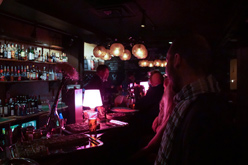 Wine bars also offers perhaps the city's most attractive meeting space for you and your customers! Conference equipment and wines can be found on site. We carry out your wishes according to the menu for your meeting if you firmer and more filling food.
Wine bars also offers perhaps the city's most attractive meeting space for you and your customers! Conference equipment and wines can be found on site. We carry out your wishes according to the menu for your meeting if you firmer and more filling food.
Request a quote / contact us!
Mika Kilpeläinen
Email: mika(a)malja.fi
Red wine is a type of wine made from dark-coloured (black) grape varieties. The actual colour of the wine can range from intense violet, typical of young wines, through to brick red for mature wines and brown for older red wines. The juice from most black grapes is greenish-white; the red colour comes from anthocyan pigments (also called anthocyanins) present in the skin of the grape; exceptions are the relatively uncommon teinturier varieties, which produce a red colored juice. Much of the red-wine production process therefore involves extraction of colour and flavour components from the grape skin.
The most significant dark grape varieties are Cabernet Sauvignon, Merlot, Syrah (Shiraz as outside Europe) and Pinot Noir. French Bordeaux region from the Cabernet Sauvignon is considered balanced flavors to variety, and it is the world's most popular and cultivation of the red quality wine grape variety.
Merlot wines are known from soft taste, which makes them easily accessible. Syrah wines are full-bodied, tannin and bold colors, and they are produced especially in warm areas. Are difficult to be grown in a well-known Pinot Noir thrives best in cool areas, and it is used especially champagne. Pinot Noir produces a fruity and acidity of wines.
White wine is a wine whose colour can be straw-yellow, yellow-green, or yellow-gold coloured. It is produced by the alcoholic fermentation of the non-coloured pulp of grapes which may have a white or black skin. It is treated so as to maintain a yellow transparent colour in the final product. The wide variety of white wines comes from the large number of varieties, methods of winemaking, and also the ratio of residual sugar. White wine has existed for at least 2500 years. It has accompanied economic development and colonized every country whose inhabitants are wine drinkers: Europe, America, Oceania, although less systematically in Africa and Asia due to climate and religious reasons.
The main white grape varieties are Chardonnay, Sauvignon Blanc and Riesling. Others have a discrete existence hidden behind the name of a wine resulting from the assembly of several varieties. Tokay, Sherry, and Sauternes are examples of these. The winemaker can also use a variety with a coloured skin provided she is careful not to stain the wort during the separation of the pulp-juice.
Sparkling wine is a wine with significant levels of carbon dioxide in it making it fizzy. The carbon dioxide may result from natural fermentation, either in a bottle, as with the Traditional method, in a large tank designed to withstand the pressures involved (as in the Charmat process), or as a result of carbon dioxide injection. Sparkling wine is usually white or rosé but there are many examples of red sparkling wines such as Italian Brachetto and Australian sparkling Shiraz.
Completely dry (Extra Brut, Brut Nature or Ultra Brut), very dry (brut) dry (Extra Sec), Kuivahko (Sec), Puolikuiva (Demi Sec), Makea (Doux), Erittäin makea (Extra doux tai Ultra doux)
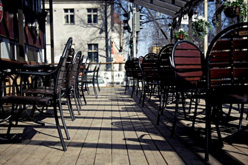 Beer and wine-tasting. Tips for food and wine combination. Wine bars also offers perhaps the city's most attractive meeting space or a celebration for you and your customers! The bowl terrace is covered, equipped with a heat lamp and open all year round! Terrace in the winter could also spot a curling track!
Beer and wine-tasting. Tips for food and wine combination. Wine bars also offers perhaps the city's most attractive meeting space or a celebration for you and your customers! The bowl terrace is covered, equipped with a heat lamp and open all year round! Terrace in the winter could also spot a curling track!
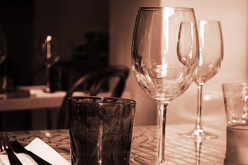 The professional staff also carries out beer and wine winetastings. At the beer school you can choose the main focus from the following: History, types of beer, brewing, and the major beer countries The main selections of the cup selections are Belgium and the Czech Republic. In elementary school, we go through all of the above. Winemaking, history, the basics of wine tasting and finally blindfold is one of our Education products.
The professional staff also carries out beer and wine winetastings. At the beer school you can choose the main focus from the following: History, types of beer, brewing, and the major beer countries The main selections of the cup selections are Belgium and the Czech Republic. In elementary school, we go through all of the above. Winemaking, history, the basics of wine tasting and finally blindfold is one of our Education products.
Ask about our special offer: cider, whisky- or a drink school!
The upstairs wine bar with affordable pricing also allows the "finer" wines "tasting" restaurant environment.
Wine bars also offers perhaps the city's most attractive meeting space for you and your customers! WLAN / WiFi. Conference equipment and wines can be found on site. We carry out your wishes according to the menu for your meeting if you firmer and more filling food.
Mika Kilpeläinen
Email: mika(a)malja.fi
Phone.+358 44 341 9081 / Mika
The restaurant is played on Tuesdays at 18.00 in Kuopio Bridge Club Association and Puijon Bridge Association's by the world's most challenging card game. Clubs organized from time to time, including courses and all are welcome to take a look at Tuesdays in the upstairs wine bar for what was going on.
The game is the intricacies of contracts and the intelligence-intensive tasks without a break - but the opening is enough know-how to calculate the thirteen!
The beer and wine restaurant Malja - Kauppakatu 29, Kuopio - Finland
Restaurant Malja has been closed for the time being due to coronavirus
Restaurant Malja
Kauppakatu 29
70100 Kuopio
FINLAND
www: www.malja.fi
Facebook: maljakuopio
Tiktok: @olutravintola_malja
Instagram: @maljakpo
CEO
email: mika(a)malja.fi
phone. +358443419081
